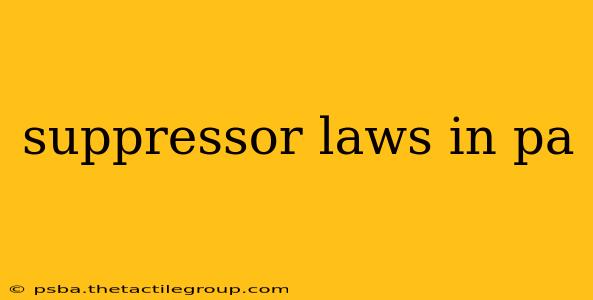Pennsylvania's laws regarding firearm suppressors, often called silencers, can be complex and confusing. This guide aims to clarify the legal landscape surrounding suppressor ownership, possession, and use within the Commonwealth. We'll cover key aspects of Pennsylvania's suppressor laws, including licensing requirements, registration processes, and potential penalties for non-compliance. This information is for educational purposes only and should not be considered legal advice. Always consult with a qualified legal professional for advice tailored to your specific circumstances.
Pennsylvania's Suppressor Regulations: The Basics
Pennsylvania classifies suppressors as firearms under state law. This means they are subject to the same regulations and restrictions as other firearms. Unlike some states with more permissive laws, Pennsylvania requires a thorough process for legal suppressor ownership.
Key Aspects of Pennsylvania Suppressor Law:
-
Federal Regulations: Pennsylvania's suppressor laws are intertwined with federal regulations under the National Firearms Act (NFA). This means you'll need to navigate both state and federal requirements for legal ownership. The NFA mandates registration of suppressors with the Bureau of Alcohol, Tobacco, Firearms and Explosives (ATF).
-
Licensing: Obtaining a suppressor in Pennsylvania involves a multi-step process. You must be eligible to possess a firearm under both federal and state law. This includes passing a background check and potentially adhering to waiting periods.
-
Registration: Once you've purchased a suppressor, you must register it with the ATF. Failure to register is a serious federal offense.
-
Permitted Uses: Suppressors can be used for hunting in Pennsylvania, provided they comply with all applicable state and federal laws. However, specific hunting regulations may vary depending on the game and season. Additionally, it's crucial to understand local ordinances, as some municipalities might have further restrictions.
-
Prohibited Uses: Certain uses of suppressors are strictly prohibited in Pennsylvania, including using them in the commission of a crime.
The Process of Obtaining a Suppressor in Pennsylvania
The process of legally acquiring a suppressor in Pennsylvania is generally time-consuming and involves several steps:
-
ATF Form 4: This federal application form is crucial for registering your suppressor with the ATF. This form requires detailed personal information, fingerprints, and passport photos.
-
Background Check: You will undergo a thorough background check, similar to the process for purchasing other firearms.
-
Tax Stamp: A $200 tax stamp is required for each suppressor you register with the ATF.
-
Waiting Period: There will likely be a waiting period before your suppressor is approved for your possession. This period can vary in length.
-
Dealer Compliance: Ensure you work with an ATF-licensed dealer who is experienced with the NFA and the process for transferring suppressors.
Potential Penalties for Non-Compliance
Failure to comply with Pennsylvania's suppressor laws, both state and federal, can lead to severe penalties, including:
- Fines: Significant monetary fines.
- Imprisonment: Potential jail time.
- Forfeiture: Loss of the suppressor and potentially other firearms.
- Felony Charges: In some cases, violations can result in felony charges.
Staying Informed on Pennsylvania Suppressor Laws
It's crucial to stay updated on Pennsylvania's suppressor laws as they can change. Regularly consult official sources like the Pennsylvania State Police and the ATF website for the most current information. Remember, this guide provides general information and is not a substitute for professional legal advice. Always seek guidance from a legal expert before making any decisions regarding suppressor ownership or use in Pennsylvania.
Disclaimer: This information is for educational purposes only and should not be considered legal advice. The laws surrounding firearm suppressors are complex and can change. Consult with a qualified legal professional for advice specific to your situation.

